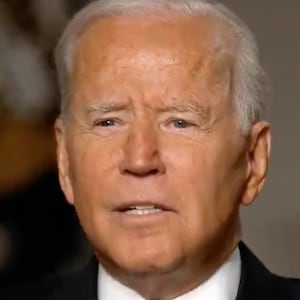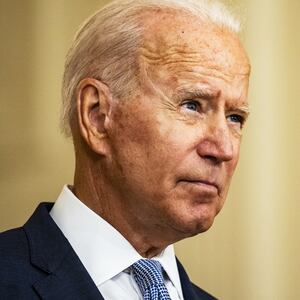In remarks given five hours after they were originally scheduled, President Joe Biden made clear that the Aug. 31 withdrawal date was a deadline his administration was determined to meet.
“The sooner we can finish, the better,” the president said.
He added that the completion of evacuation efforts by Aug. 31 depended on the Taliban continuing to cooperate and allowing access to the airport. But he also said he had asked the State Department and the Pentagon for contingency plans if it became necessary to stay in the country longer, so that the U.S. could continue to get Americans and Afghan allies out of the country.
Since Aug. 14, the U.S. has helped evacuate 70,700 people, Biden said, and more continue to be flown out of the country.
The president cautioned, however, that the longer troops stay, the more dangerous the mission becomes, as ISIS-K, an Afghanistan affiliate of ISIS, seeks to target the airport in Kabul.
“Every day we're on the ground is another day we know that ISIS-K is seeking to target the airport and attack both U.S. and allied forces and innocent civilians,” he said, adding that while the Taliban was currently cooperating, the situation was “tenuous.”
On Wednesday, Biden said, Secretary of State Tony Blinken would hold a briefing to detail “exactly how many Americans are still in Afghanistan, how many we got out and what our projection is.”
Biden’s public remarks reflected the shakiness of the situation in Afghanistan as the U.S commitment there comes to an end. With lawmakers back in Washington, Tuesday was a day full of briefings with domestic and international stakeholders about the current state of operations in Afghanistan.
In a meeting with the leaders of the G7, Biden “confirmed we are currently on pace to finish by August 31st and provided an update on progress in evacuating Americans who want to come home, third-country nationals, and Afghans who were our allies during the war,” according to a readout provided by White House Press Secretary Jen Psaki.
According to the readout, Biden also made it clear that with each day of operations on the ground, “we have added risk to our troops with increasing threats from ISIS-K, and that completion of the mission by August 31st depends on continued coordination with the Taliban, including continued access for evacuees to the airport.”
That also appeared to be the message delivered in a briefing on Capitol Hill, where lawmakers huddled Tuesday morning with Blinken, Defense Secretary Lloyd Austin, Chair of the Joint Chiefs Gen. Mark Milley, and Director of National Intelligence Avril Haines.
While several members offered tepid praise of the briefers and the pace of the evacuation effort outlined in the meeting, several members—including some fromthe president’s own party—expressed concern about the White House’s decision to stick to the Aug. 31 deadline, even with unidentified “contingencies” in place.
“All I know is that we have a moral obligation to ensure that we get American citizens out, and our Afghan partners out there are more of those folks in the country in Afghanistan right now that we have the capability to evacuate between now and the end of the month,” said Rep. Jason Crow (D-CO), an Iraq and Afghanistan war veteran, told reporters on his way out of the briefing. “That's why the mission must be extended.”
House Foreign Affairs Chairman Adam Smith (D-WA) said he was “confident” the U.S. would get as many American citizens and Special Immigrant Visa holders out of the country as possible before the end of the month, but said he pressed the officials on what would happen if they fell short.
“I was very specific, you need to have a plan to go past the 31st and they assured me that they do,” Smith told reporters on his way out of the briefing. “Of course there is a contingency to go past August 31, it would be malpractice if there wasn’t.”
Rep. Mike McCaul (R-TX), the top Republican on Foreign Affairs, was less diplomatic in his assessment of the fallout if Afghan allies, in particular, are left behind.
“[Biden] will have blood on his hands, because they will execute them when we withdraw,” McCaul told CNN in an interview Tuesday night.








